A Thousand Strange Places
“Traveling – it gives you
home in a thousand strange places, then leaves you
a stranger in your own land.” ― Ibn Battuta
Article and photos by David
Joshua Jennings
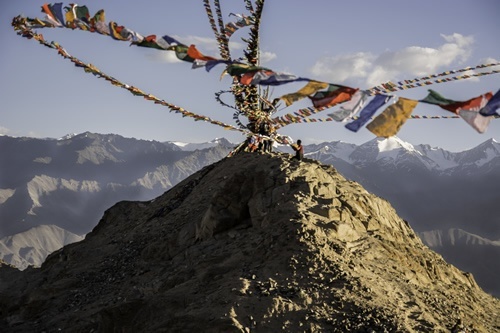
|
|
Hanging flags on top of a mountain in Lahahk, India
|
Rattling across a steel bridge on the
way out of Varanasi, my legs dangling out of the open train
door, I watched the Ganges River pass below, the orange
lights of the midnight ghats far in the distance, wavering
on the water. Two teenage boys were looking over my shoulder,
and behind them a half-dozen others were squatted on shawls
and luggage. We were sharing the ground outside the toilets
in a third-class sleeper train, near the doors. We would
spend the next several hours there, in that way, our cramped
bodies against one another, waiting for a seat to open up
on the overbooked train.
It was not my first time to spend the
night on a train floor traveling in India. Berths for all
classes were often booked weeks in advance, and for when
I made last-minute travel decisions, as was often the case
(I’d decided my destination at the train station), I would
always carry a shawl and a mat to make the floor more comfortable.
One by one, those who shared the compartment
with me disembarked onto feebly lit stations across Bihar.
No seats opened up, but when the compartment eventually
emptied, I bolted one of the doors and leaned against it
with my legs outstretched. As I wrapped the straps of my
bags securely around my arms and legs, so that I would wake
if someone tried to take them, I thought of a story my fiancé
once told me: a family acquaintance of hers, who often slept
near the doors as I did, was unfurling his sleeping mat
one day when the train shook suddenly and tossed him out
the open door onto the tracks, nearly killing him.
I wrapped the shawl around me and drifted
in and out of sleep to the clank and shift of the rails.
I was on one of my final extended rail journeys before returning
to the United States after many years abroad. This particular
adventure had begun in the north India, in Himachal Pradesh,
near the Jammu & Kashmir border. I was a few days into
a month-long rail trip to Bengal in the east, and then south
to the southernmost station in India, at Kanyakumari — a
single chapter in my dream of seeing as much of the Indian
Railways as I could.
I’d spent more than three years traveling
India, and although that time had given me enough stories
to reflect on for many years, I still felt that I’d only
begun to scratch the surface of that vast
and multifaceted country.
Before my first visit years ago, I hadn’t
been so interested in India. I simply came because it was
a convenient halfway meeting point between Istanbul, where
I was living, and Australia, where my girlfriend at that
time was living.
Before arrival, I had done almost nothing
to prepare myself. And India, especially for the unprepared,
can be a daunting place. I remember how dirty and chaotic
it seemed those first few days. But once the shock wore
off and my mind cleared, I was deeply affected by what I
saw and experienced. I only stayed two weeks, but the seeds
had been sewn for a relationship that I knew would last
the rest of my life.
But never could I have imagined, many
years later, sleeping on the floor of a night train rolling
across Bihar in pursuit of another unknown corner of the
country, a corner that was no geographical place, but the
wandering trains themselves.
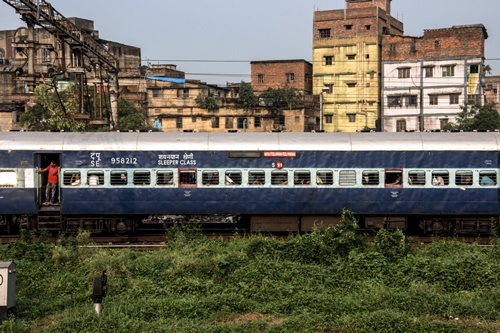
|
|
A typical train passing through a town in India.
|
I’m not a fan of destinations.
There’s too many of them and they’re all quite similar.
For the most part, destinations are already defined. They
already know you and the rest of your demographic are coming.
Internet ads catering to your browsing history may have
first aroused interest, or perhaps a magazine or guidebook.
The trails are already roped off, the signs have been posted,
and the gift shops set up. The best photo spots are often
marked on maps handed out by the tourist bureau. The best
shots are on sale at the postcard racks. Millions have come
before you. Millions will come after you.
But every destination is also a place,
the undefined, quiet, wordless soul of a land and its people.
In the cool hours of dawn, before the tourists arrive, and
in the kitchens and conversations of natives, the place lives
on, mercurial, vast, and full of its natives’ dreams, in
which you, the transient, are but an hour of stray clouds.
If we think that we have truly experienced a place in the
span of a short holiday, then we are mistaken. Places take
time. What we often see is our own shadow thrown upon a
stage curtain. We have not seen behind the curtain. With
time, the curtain begins to withdrawal. Sometimes it never
does. But there is no other way. Without time, one is doomed
to destination.
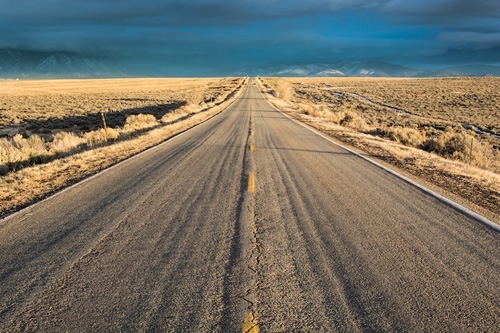
|
|
The open road in India.
|
Movement is full of distractions. Where
will you sleep? Where will you eat? How will you get there?
Move too fast, the places blur, and the people you encounter
become mere utility.
There are two solutions: stop moving,
or move mindfully. Stay in one place and watch the curtain
withdrawal and the place appear, or make movement
itself into poetry.
Between us and anywhere else is an unwritten
story. There are oceans, deserts, cities, forests, fields
of snow and ice, and, of course, the people who know these
places deeply. Fly over them and you experience little but
stale air and jet lag. Moving through them on wheels or
in a boat enhances the story. Set out on foot and the story
broadens even more. New characters appear who change your
life and depart; others stay, while the oldest in memory
fade from recognition. The traveler undergoes transformation
after transformation. It is possible that by the time the
traveler arrives, the original destination has been all
but forgotten, and the individual who took the first step
of the journey no longer exists.
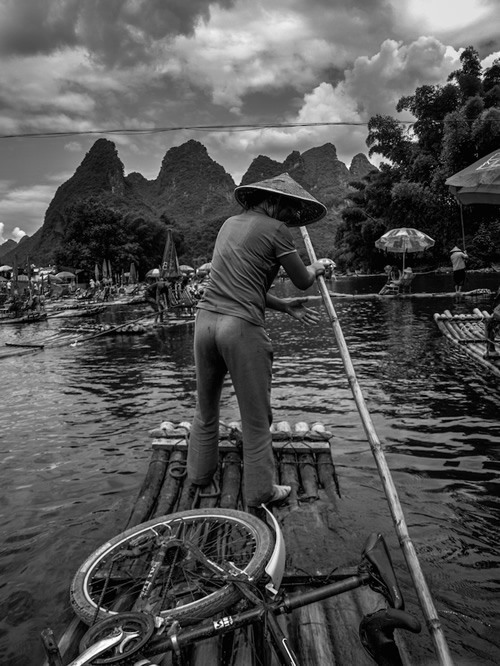
|
|
Woman rowing basic boat with bike on it in Ladahk.
|
As a long-term traveler, I have become
fixated on modes of transportation. In my early 20s, I hitchhiked
almost everywhere. Some of it had to do with being broke.
Mostly, it was the result of a lust for the adventure. When
hitchhiking, I only had to have the vaguest of destinations
in mind when I set out. Often I didn’t care when or if I
arrived. Hitchhiking wasn’t about arriving; it was about
surrendering to whatever happened. I never knew who was
going to pick me up, or where they might take me. I could
have flown, or taken a bus when I had the money, but looking
back I see I would have been robbed of many revelations.
I traveled all over Western and Eastern Europe in this way,
over the span of many years. It was never about destination.
Hitchhiking itself, and the kind people who picked me up, were the
destination. The cities along the way were often merely
rest stops.
As with anything else, so much time
hitchhiking revealed certain things to me, such as the fact
that it is the perfect opportunity to practice a new language.
While living and traveling in Turkey, I carried a Turkish-English
dictionary and language notebook along with me on all my
hitchhiking adventures. I mostly tried to get rides with
truck drivers, as they were usually going long distances
and were always friendly and open to letting me ride with
them. Stuck there in the truck with each other for so many
hours, we would try our best to communicate our stories.
Given that they rarely spoke English, we had to communicate
in Turkish, which forced me to practice for hours on end.
I would have my notebook out, looking up words I didn’t
know, making notes. As the driver had nowhere else to go
and nothing to do but drive, they were patient with my mistakes,
and I was able to improve quickly. And once you become conversant
with the local language, an entirely new country opens up
to you, one that was invisible, inaccessible before. Suddenly
idle chatter in the streets becomes comprehensible, and
everything ones does becomes a lot less daunting.
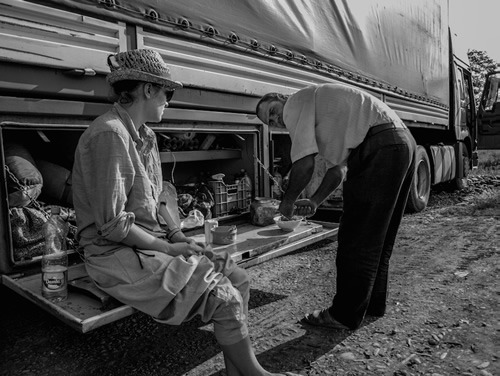
|
|
The author hitching a ride.
|
By the time of my first long travels
through India, my fixation had transferred onto train travel,
a fixation that leads me to think about how certain obsessions
can add richness to one’s travel experiences.
There will be a significant difference
in the travels of those who come to India to see the Mughal
palaces of Delhi, the forts of Rajasthan, or the Taj Mahal,
versus those who build their travels around a particular
concept, such as the Ganges River, tribal culture, or the
Indian Railways. The latter will draw you away from destinations and
bring you closer to places you may have never known existed.
Concept travel will also expand your knowledge into a particular
area, far deeper than it would if you stick to an itinerary
of unlinked “star” attractions.
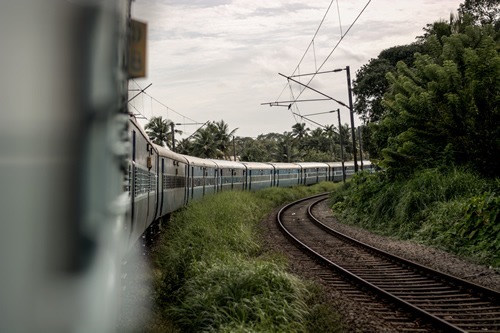
|
|
A train turning in India.
|
Then, each morning when I opened my
eyes, the scene was no longer unfamiliar.
A steep valley lay at my doorstep. Beyond,
the vast western stretch of the Himalayas rose into the
sky above the snowline. Each cloudless morning the sun rose
over the mountain range, and the light poured onto my fiancé
and me as we lay in our bed through the front windows.
Then the routine: I would make coffee
in the little kitchen while she watched with drowsy eyes.
I’d open the door, allowing the fresh air in. I’d boil milk
and prepare coffee. She would cook breakfast. After watering
my plants and breakfast on the front porch, I’d begin my
way down the trails towards the Library of Tibetan Works
and Archives, where I would spend my day reading and writing.
I was living in a place difficult to
simply happen upon, a place one could only hear about from
a local, or someone who’d found it by providence, a village
about a half-mile below the well-known Tibetan-Indian town
of Dharamshala, in North India. I lived in that village
for over a year, after having lived in another similar,
nearby village for year before that.
We pass by so many small places in the
course of our travels, so many places we could imagine staying
for longer. Sometime we build a life there in our minds,
and sometimes we stay, receiving rewards beyond measure.
Having been born and raised on the flat
plains of Oklahoma, village life in the mountains was the
antipodes of much that I had known. Electricity outages
were common, the nearest road was a steep climb up the mountainside,
and monkeys were no strangers to the garden. I literally
opened my door onto snow-capped peaks, and during the spring,
thousands of butterflies would fly by every morning. I would
sometimes spend up to an hour each day just lying in my
hammock, watching the drama, observing the natural world,
observing village life, which was often so much more interesting
than any entertainment I could receive through a screen.
I did not feel like a visitor there.
I did not feel like a transient. In a way, it was not travel
in the sense of traveling to a place, but rather expanding
myself into a certain mode of time, a circuitous, seasonal
time that cannot be visited, only lived. In this sense,
it was not a destination in the sense of a destination at
the end of a line, but rather a circle of being one breaks
through the boundary of and falls into, and the only thing
that can break through that boundary is a disrobing of all
previous notions of time.
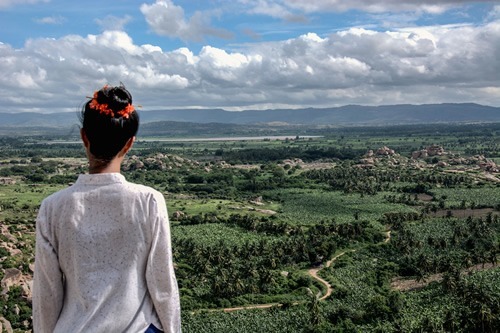
|
|
Overlooking Hampi, India.
|
I lived in that tiny village, day after
day, month after month, breathing in the fresh air, getting
to know more deeply my fiancé, as well as other locals and
friends, tending my few, close relationships, with many
days each week involving little more than a hike to the
river or a series of conversations.
I could visit all the large cities in
the world and, in a sense, not go anywhere as long as I
looked at them with the same mind. It is only when you place
yourself in an environment wherein the mind slows down or
stops and everything you once accepted is thrown into a
beautiful crisis that you are really even going to any place
different. Wherever you go, you can go only go so far physically,
and in the modern world, where nearly anywhere on the planet
can be reached in a matter of hours or days, you can never
really go very far, physically, at all. So often it is only
in a narrative sense that true adventures can take place.
Spatially, pretty much everywhere has been covered. Nothing
is new under the sun, no matter how special you believe
yourself to be. There can only be a shift in the mind, in
which everything is new at every moment, and can be renewed
with the blink of the eyes.
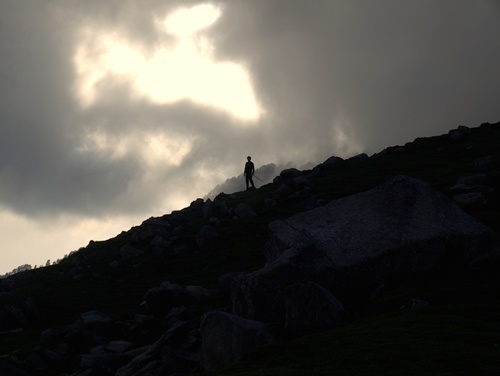
|
|
Standing on a steep hill in the evening.
|
At times, if you are lucky, the moment
comes when there is nowhere else you need to be but right
where you are. The machine of creating futures powers down
and all is quiet. You are there. There is no thought as
to where you will be, or reaching for where you
have been. You have expanded yourself into a place, melding
into it. In such stillness, silence and understanding deepens.
There are many forms of travel, with
different purposes and approaches, and each had its merits.
Outside of packaged tourism, which has never much interested
me, I’d like to think I’ve tried most of them, and from
each I’ve derived experiences and qualities far worth their
weight in gold. But that which has affected me the most
deeply has been the slow, immersive kind.
My trips have almost never lasted less
than a few months. Those who tell me of grand plans of weeklong
vacations always make me a little uneasy. What can be experienced
in a week? How many false conclusions would I arrive at
if I only spent a week in a place? I understand they haven’t
the time, and their priorities are doubtlessly much different,
but I also know that deep travel requires time and a paradigm
shift. It will be difficult for those who value their career
or their social ranking within a particular community to
give all that up to engage in long-term immersion travel.
It is possible such travel will negatively affect your career.
It may even end it. But are we our careers? Or are we simply
beings thrown into a vast and beautiful world for the blink
of the eye?
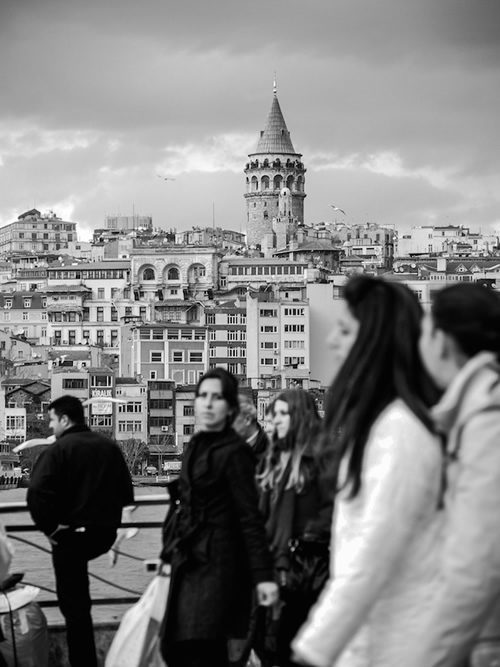
|
|
People waiting in front of the Galata Tower in Istanbul.
|
For two years, in my mid-twenties, I
lived in Istanbul. The city gave birth to me as an adult
and was the harbinger of whole worlds of experience. I lived
in seven different apartments throughout the city, but the
most memorable was a house I shared in Cihangir, near Taksim
Square, in the heart of the European Quarter, with all my
favorite bars, restaurants and the apartments of many good
friends within easy walking distance.
It didn’t take long to feel like a fish
in water in that city, with an internal map of all my favorite
alleys and neighborhoods, and friends who would drink with
me on any night of the week. And many nights we did drink,
in the random apartments of other young expats or locals,
or on the cobbled streets of Nevizade, or in the square
below Galata tower. They were two of the most formative
years of my life, and I savor every memory.
But then I left. I traveled around India,
Nepal and the United States, and when I came back a year
later for a brief visit, everything had changed. In a way,
everything was the same — the same streets with the same
buildings, the same shopkeepers, and the same waiters at
the same restaurants – but the whole city was different
because of the distance we now held between us. The Istanbul
streets were no longer my intimate companions. They had
become distant from me. And all of my friends were gone,
save one, whose social circle was now unfamiliar.
I was there for three days, and I spent
them wandering my favorite neighborhoods, just as I had
for the years I lived there. I revisited the apartments
I had lived in, and stood below the 3- and 5- and 7-storey
windows I had once looked out of, recalling the friends
I had lived there with, and the long nights, and all the
mornings spent watching the sun rise over the metropolis,
recalling what was important to me at that time and wondering
how such things could have ever been important to me, and
at how one’s life could change so completely so fast.
I drifted through the markets full of
a deep and sacred melancholy, nostalgic for this foreign
place, which I had called home, which had somehow felt like
home more than the place I was born and raised. The stench
of the fish and muscles and the roasting chestnuts carts,
the Turks in their demure winter coats, their breath visible
in the Bosphorus air, the tramcar dinging by with youngsters
hanging off the side…
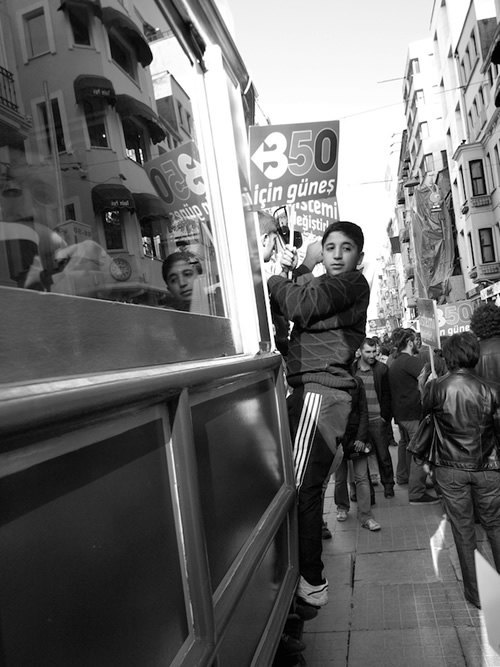
|
|
Boy holding onto a bus in Istanbul.
|
This feeling, this intimacy with a city
that throughout my childhood had seemed such an alien and
distant world… I marveled at how it had become entwined
with me, how it was me, and I it, how
we would never be free of each other. Our relationship was
the fruit of a philosophy I had adopted when I first began
traveling: that of immersion and dedication and deep interest
rather than passing vacation, the refusal to view it as
simply a destination. I had embraced it as a home and it
had showered its gifts upon me, and transformed me.
But my seeing had also changed, and
I now looked upon it as I might an old photograph of myself,
questioning who it was, exactly, in the picture.
This is what long-term immersion travel
does. It peels your culture off like a skin, exposing a
fresh one, born of the old but moist with rebirth. All travel
does this, but the deeper you go in time, the deeper the
rebirth, the wider the eyes, and when these eyes are carried
back into the familiar, whether it be into your home culture
or into an adopted one, everything is thereby illuminated,
and you yourself are illuminated with a deep and internal
heat that almost nothing can extinguish.
David Joshua Jennings is a writer and
photographer from Oklahoma, USA. You can find him at davidjoshuajennings.com.
|
